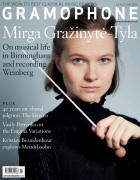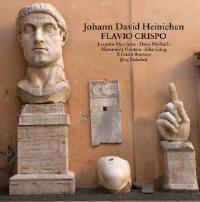Texte paru dans: / Appeared in: |
|
|
Outil de traduction (Très approximatif) |
|
|
Reviewer: David Vickers Flavio Crispo (1719/20) was abandoned during rehearsals. According to the eyewitness Quantz, the castrato Senesino lost his temper, tore up a colleague’s aria and threw it at the Dresden Kapellmeister’s feet; this misconduct caused the king to cancel all the Italian singers’ contracts – probably the outcome Senesino had contrived so that he could join the Royal Academy of Music and Handel in London. An almost complete manuscript score and a handwritten libretto are both preserved in the Sächsische Landesbibliothek. The missing music of the final chorus is reconstructed from one of Heinichen’s concertos by Maxwell Sobel, whose edition is recorded by the Stuttgart ensemble Il Gusto Barocco. The plot concerns amorous and political entanglements caused by the conflict between the third-century rival Roman emperors Constantine and Maximilian; to make life complicated, Constantine’s new wife Fausta (Maximilian’s daughter) has the hots for her stepson Crispo, and so does the captive daughter of the king of Franconia. However, Crispo has instead fallen in love with the English princess Elena (who Maximilian’s son Massenzio also desires, while resenting everyone in Rome that removed his family from power). It gets even more complicated. Jörg Halubek’s shaping of attractive arias is spot-on. Crispo’s ‘Basta à me luci adorate’ is a gentle triple-time love song in which muted violins and violas play in unison, doubled by flutes, and over pizzicato basses – the hero’s tender music is sung sensitively by Leandro Marziotte. Elena’s ‘Chi chiedesse all’augelletto’ juxtaposes delicate pizzicato strings, rapturous obbligato flute and Dana Marbach’s limpid singing; ‘Io vorrei saper d’amore’ is too breezy to convey Elena’s desperation for death to end her plight but Heinichen’s music, featuring an elaborate archlute solo, is wonderful. Imilee’s ‘Se tal sull’alme regni’ is a Venetian-style aria with passages for noble horns in alternation with orchestral tuttis for strings doubled by flutes, the voice part doubled sweetly by violins and sung ardently by Silke Gäng. There is also a Vivaldian quality to Costantino’s hushed ‘Bella pace, in più placide cure’, its mingling of octave leaps and suave melodicism sung with grainy intimacy by Ismael Arróniz. Notwithstanding Alessandra Visentin’s feisty singing, the crucial role of Fausta is diminished by heavy cuts; even her vivid horn-laden vision of the Furies in response to her husband’s brutal order that she is to be boiled to death in the baths (‘Già dal profondo’) is reduced to only its first section. Ten scenes are omitted entirely, skipping over almost every essential crisis in the plot. Elsewhere, recitative conversations between characters are often abridged to a sketchy minimum; an otherwise admirable recording has its theatrical coherence diluted to oblivion. The scene in which the imprisoned Crispo drinks poison (‘Vieni, o tosco’) – which he does not know his friend Gilimero has swapped for a sleeping draught – is not on a par dramatically with the similar scene Senesino later sang in Handel’s Tolomeo (1728); a sentimental triple-time lament featuring five-part muted strings (including pizzicato bass line, without harpsichord) is charming but the hero remains conscious long enough to sing an incongruously sunny love duet with Elena. On the other hand, Costantino’s guilt at the apparent death of his honourable son is a hauntingly restless G minor aria with contrapuntal tensions (‘Vostre imagini noi non siamo’). Heinichen’s opera emerges from its long neglect into an appreciative light, but the integrity of its text deserved better treatment. |
|




